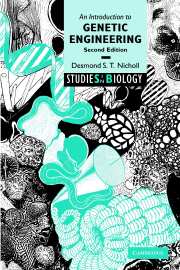Book contents
- Frontmatter
- Contents
- Preface to the second edition
- 1 Introduction
- Part I The basis of genetic engineering
- Part II The methodology of gene manipulation
- Part III Genetic engineering in action
- 9 Understanding genes and genomes
- 10 Genetic engineering and biotechnology
- 11 Medical and forensic applications of gene manipulation
- 12 Transgenic plants and animals
- 13 The other sort of cloning
- 14 Brave new world or genetic nightmare?
- Suggestions for further reading
- Using the World Wide Web
- Glossary
- Index
14 - Brave new world or genetic nightmare?
Published online by Cambridge University Press: 05 June 2012
- Frontmatter
- Contents
- Preface to the second edition
- 1 Introduction
- Part I The basis of genetic engineering
- Part II The methodology of gene manipulation
- Part III Genetic engineering in action
- 9 Understanding genes and genomes
- 10 Genetic engineering and biotechnology
- 11 Medical and forensic applications of gene manipulation
- 12 Transgenic plants and animals
- 13 The other sort of cloning
- 14 Brave new world or genetic nightmare?
- Suggestions for further reading
- Using the World Wide Web
- Glossary
- Index
Summary
This final chapter is short. It does not answer any questions, but simply raises them for consideration. There are no ‘correct’ answers to these questions, as each must be addressed from the perspective of the individual, family, society, race or nation that is facing up to the situation. There are no diagrams or photographs, and very little factual information. However, the topics discussed are probably the most important that a student of genetic engineering can consider. In practical terms, relatively few people will ever go on to work in science and technology, but we will all have to cope with the consequences of gene-based research and its applications. Informed and vigorous debate is the only way that the developments of gene manipulation technology can become accepted and established.
Is science ethically and morally neutral?
It is often said that science per se is neither ‘good’ nor ‘bad’, and that it is therefore ethically and morally neutral. Whilst this may be true of science as a process, it is the developments and applications that arise from the scientific process that pose the ethical questions. The example that is often quoted is the development of the atomic bomb – the science was interesting and novel, and of itself ethically neutral, but the application (i.e. use of the devices in conflict) posed a completely different set of moral and ethical questions. Also, science is, of course, carried out by scientists, who are most definitely not ethically and morally neutral, as they demonstrate the same breadth and range of opinion as the rest of the human race.
- Type
- Chapter
- Information
- An Introduction to Genetic Engineering , pp. 259 - 262Publisher: Cambridge University PressPrint publication year: 2002



